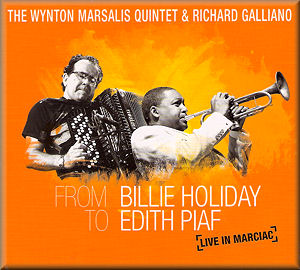1. La Foule
2. Them There Eyes
3. Padam...Padam
4. What a Little Moonlight Can Do
5. Billie
6. Sailboat in the Moonlight
7. L'Homme ŕ la Moto
8. Strange Fruit
9. La Vie en Rose
Wynton Marsalis - Trumpet
Richard Galliano - Accordion
Walter Blanding - Tenor sax, soprano sax, clarinet
Dan Nimmer - Piano (tracks 1-8)
Hervé Sellin - Piano (track 9)
Carlos Henriquez - Bass
Ali Jackson - Drums
The album title may seem puzzling, as Billie Holiday and Edith Piaf
had such different vocal styles. Billie was a laid-back American jazz
singer; Edith was "the little sparrow" from the Paris streets,
whose repertoire drew much from the dramatic chanson. Yet they
both had tortured lives, which they expressed through their often
plaintive singing. And this CD plus DVD pays tribute to both vocalists,
mainly by means of songs associated with each of them. These recordings
were made in August 2008 during Wynton Marsalis's annual appearance
at the Marciac Jazz Festival. Wynton's quintet was joined by special
guest Richard Galliano, whose accordion playing I have hailed several
times on this website. So the two leaders were both superb musicians
- but so were the other members of the group. As with most Marsalis
bands, this one contained only virtuosi.
You might think that Wynton Marsalis (an American) and Richard Galliano
(a Frenchman) could be as far apart in style as Billie Holiday and
Edith Piaf, yet they work together empathically here. Both men obviously
appreciate the emotional similarities between the two singers. and
they are both are capable of communicating this instrumentally. One
delight of this package is that the CD is accompanied by a DVD of
the concert, so you can see what the musicians are doing as well as
hearing them.
The concert opens with La Foule, a jolly piece (although it
was ultimately sad when Piaf sang it) with a swaying rhythm and Gallic
ambiance (at which Galliano is expert). Marsalis and Galliano contribute
fine solos, and pianist Dan Nimmer adds a Latin-American flavour in
his solo. The seemingly unstoppable Galliano stretches out the ending
by repeating the tune's basic riff.
The mood switches to jazz for Them There Eyes, the melody
stated by the tenor sax of Walter Blanding, who slides into a gliding
solo. With brilliant fingerwork, Richard Galliano shows he is as adept
at jazz as every other form of music and Marsalis plays games with
the beat in his solo. The tenorist rounds off the number with an adventurous
cadenza. The waltz Padam...Padam again evokes Edith Piaf. Blanding
plays a finely ornamented solo on soprano sax, and Marsalis flies
high in his improvisation. The pianist changes to 4/4 for his solo
before settling back into waltz time.
What a Little Moonlight Can Do - forever associated with Billie
Holiday - is taken at a fast tempo. Drummer Ali Jackson solos on the
rim of his snare drum and on hi-hat before Wynton takes a coruscating
solo. The focus on Billie Holiday continues with Richard Galliano's
composition Billie, a poignant tune which pays the singer heartfelt
homage. Galliano's playing tugs at the heart-strings. Sailboat
in the Moonlight is another of Billie Holiday's specialities,
here focusing on pianist Dan Nimmer's Garneresque pastiche. Dan stays
the right side of parody but he makes me smile broadly. This truly
is a musician to watch - but then so are all the other members of
the band.
L'Homme ŕ la Moto - actually written by Lieber & Stoller
- is accompanied by appropriate motor noises from the scratchy bowed
bass and the hooting trumpet and saxophone. After their impressive
solos, Marsalis and Galliano duet together in good-humoured dialogue
before a skilful drum solo. This is the longest track on the CD and
DVD (nearly 11 minutes) but it has no longueurs.
After the high spirits of this piece, Strange Fruit (Billie
Holiday's most historic song) has extra seriousness, with Wynton's
tortured trumpet squealing out, and funereal drums accompanying his
mournful theme statement, while the clarinet weaves in and out. Using
a plunger mute, Marsalis makes the trumpet sob and scream: this is
clearly a tune he feels deeply, as it encapsulates the brutal experiences
of African Americans over the centuries.
La Vie en Rose strikes a happier note to end the concert.
It's the sort of bitter-sweet song you can imagine Billie Holiday
singing as well as Edith Piaf (did Billie ever record it?). Richard
Galliano's accordion is beautifully lyrical here - even the previously
solemn bassist is moved to smile.
No regrets? Non! Je ne regrette rien. In fact, this is already one
of my albums of the year.
Tony Augarde
